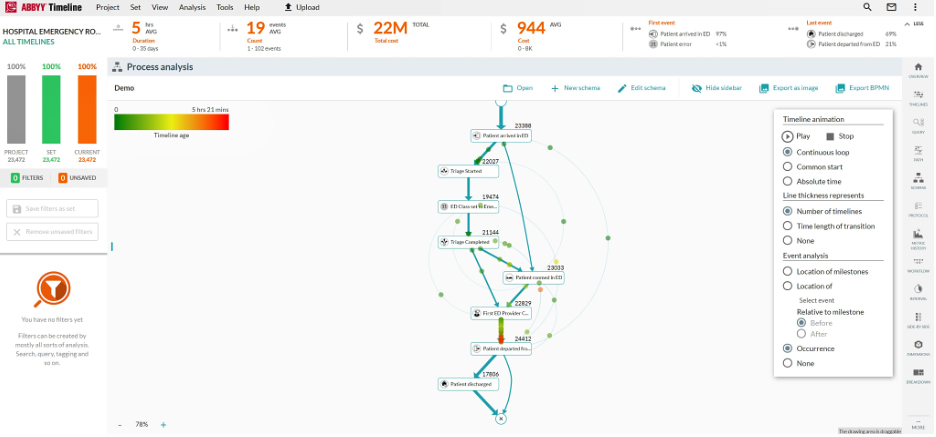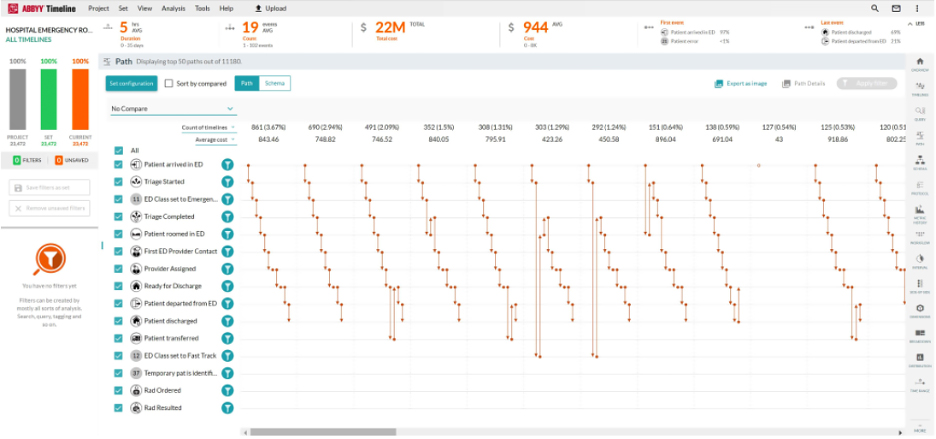Do You Need Process Intelligence for Successful Digital Transformation Outcomes?
Ryan Raiker
August 20, 2020

While 80% of the companies surveyed by McKinsey consider digital transformation a top corporate priority, nearly 70% fail to meet expectations.
There are several factors that contribute to such an outcome. Perhaps the most compelling reason is a lack of visibility into how business processes actually execute. Without a complete understanding of all the components of the business process, organizations lose the ability to identify where the weaknesses lie and plan for improvements. As Peter Drucker, the founder of modern management theory, said: “you can’t manage what you can’t measure.”
ABBYY Process Intelligence is designed to help organizations discover and measure how current processes work, identify process bottlenecks, and surface areas for process optimization based on four foundational pillars:
- Creation of a “digital twin” of the event data from disparate systems of record associated with business process execution;
- Analyzing the performance of any process type, particularly highly variable case management processes;
- Real-time Operational Monitoring of process behaviors that empower business users to remediate process bottlenecks; and
- AI/ML-based predictive analytics allows users to proactively identify the outcome or performance of any process instance in the early stages of the process execution.

Creation of a Digital Twin of Your Business Processes
The foundation of Process Intelligence is an analysis of event logs at a granular level, as they occur. Invariably, event logs include an object (e.g., order submitted, patient departed, the adjuster assigned, ticket escalated), a Timestamp, which shows when something happened in the life of the object, and an Event Identifier, which could be an Order ID, Invoice #, Claim ID, Patient Encounter Number, and so on.
Event logs associated with business processes span across disparate systems of record and generate an unprecedented amount of data from both digital and physical sources. While utilizing ETL (Extract, Transform, and Load) tools to access event logs is one option, it is time-consuming and requires considerable expertise to prepare, sanitize, and normalize the data.
ABBYY Process Intelligence incorporates a more effective methodology that allows raw event log data to be loaded directly from your systems of record for immediate analysis, which eliminates the need to pre-process data using complex ETL and data blending tools that often require assistance from IT personnel. It provides users significant flexibility in loading incremental data in real-time, which supports continuous discovery and analysis of process execution, thereby enabling you to accelerate time to value associated with your digital transformation initiatives.

Analyzing the performance of any process type, particularly highly variable case management processes
Often the most challenging, yet most impactful, areas for process discovery and analysis are case-based processes, for example, customer-facing processes such as call center operations, health care administration, and claims processing.
Improving customer service levels means minimizing friction in customer engagement processes. By understanding process performance at every step by visually displaying process bottlenecks and surfacing the root causes of process inefficiencies, you can easily identify areas for process improvement – sometimes in places you weren’t even looking. For example, healthcare providers are being asked to do more with less amid tremendous complexity to improve the patient experience, reduce waste, increase efficiency, and optimize processes. Yet another example is continuous improvement within customer call center operations to identify and optimize ticketing process bottlenecks and to uncover and avoid SLA violations.
ABBYY Process Intelligence can help your organizations easily identify, quantify, and target the highest-impact process instances for digital transformation or automation initiatives.
Real-time Operational Monitoring of process behaviors that empower business users to remediate process bottlenecks
Having insight to and being able to visualize how your processes behave empowers your organization to remediate inefficiencies and make informed decisions as to what aspects of your processes should be standardized through a combination of automation and more effective deployment of human capital through:
- Protocol analysis that must be followed and identifying processes that fail to meet those conditions
- Alerting the right staff or automating remediation to ensure processes are functioning properly, and eliminating bad processes before they happen with ongoing monitoring
- Automatic comparison pre and post initiative process instances side by side to identify if your process improvements are performing as planned
AI/ML-based predictive analytics that allows users to proactively identify the outcome or performance of any process instance in the early stages of the process execution
One of Peter Drucker’s often-quoted advice is “the best way to predict the future is to create it.” Process Intelligence enables organizations to have continuous visibility to how processes behave. Based on such insight, then re-imagine how process optimization can create sustainable competitive advantages by focusing on those business processes that are proven to generate reduced transaction costs and improved customer service levels. What if you could not only see what will happen next but also prescribe a solution to avoid a problem or costly mistake before it happens? That is what the ultimate objective of digital transformation is all about: predicting the future process state. By combining process mining with machine learning and artificial intelligence, your organizations can achieve highly integrated and fully automated insights to forecast processes in their future state and take action to ensure positive outcomes.
Learn more about the journey from process mining to Process Intelligence with Prof. Dr. ir. Wil van der Aalst.
Prof. Dr. ir. Wil van der Aalst has made it his life’s work to enable organizations to gain visibility into their business processes and empower them to make informed decisions to optimize them, based on objective and measurable criteria.
Watch now and gain insights into how continuous advances in process mining will help your digital transformation journey by uncovering and improving your processes, thereby achieving business agility.

